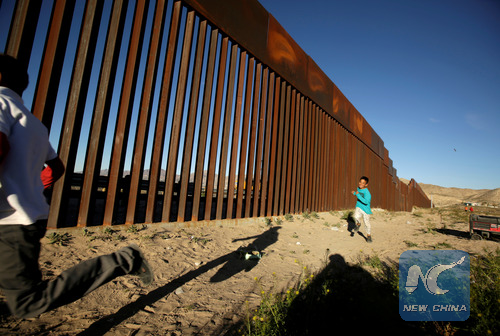
File photo: Children run along the border fence between Mexico and the United States, Feb. 26, 2019. (Xinhua/Reuters)
UNITED NATIONS, June 27 (Xinhua) -- Henrietta Fore, executive director of the United Nations Children's Fund (UNICEF), on Thursday spotlighted the "dire" government border shelter facilities on the U.S.-Mexico border.
A picture of drowned Salvadoran migrant Oscar Martinez and his two-year-old daughter Angie Valeria's lifeless bodies on the banks of the Rio Grande River was published on Wednesday, evoking strong reactions concerning migrants' protection.
In a strongly worded appeal to countries of origin, transit and destination to do more to protect vulnerable migrants, Fore in particular highlighted the dire government border shelter facilities on the U.S.-Mexico border, saying these centers cause "lasting harm" to youngsters in need of help.
"Recent reports coming from some of these facilities are grim," she said. "Children should not be in unsafe environments that can cause toxic stress and irreparable harm to their health and development."
In comments that followed Tuesday's resignation of the acting head of the U.S. border protection agency amid reports that migrant children lacked basic necessities, including soap and toothbrushes, at a center in Texas, the UNICEF chief said "It's hard to fathom this happening in a country with such a rich history as a champion for children in need around the world, particularly for those uprooted from their homes and communities by crisis."
Describing her encounter this week with Central American migrant families at a migrant shelter in Tijuana, Mexico, Fore said that some youngsters had already been traumatized either in their home country or en route to the U.S. border.
"None wanted to leave their countries, but all felt they had no choice because of the threat of gang violence or oppressive poverty ... This is a dire situation requiring urgent action and funding to provide children and families with essential services and support," she said.
While UNICEF is working to give migrant children better access to protection, education and other services "wherever they may be in the region," Fore urged national authorities to follow suit and ensure their rights, protection, wellbeing and dignity.
"No one country can do it alone," she said. "Addressing the root causes of forced migration and the needs of uprooted children requires serious commitment, resolve and resources."

